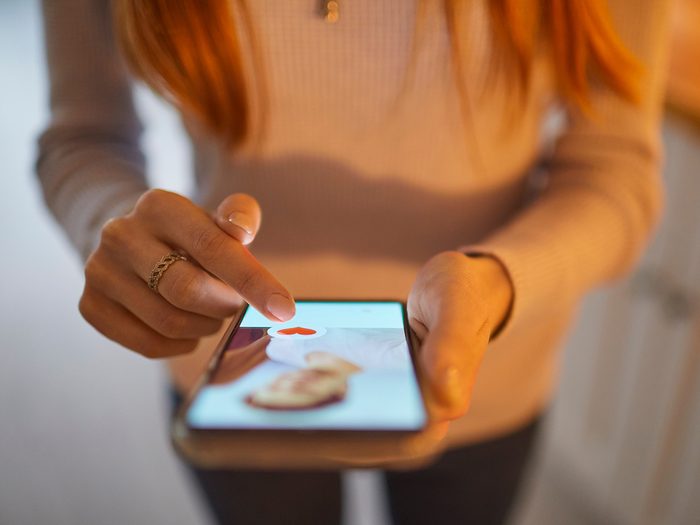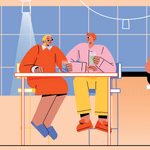Online Dating: Would You Date Someone Who’s Unvaccinated?

Dating apps like Hinge and Bumble now allow Canadian users to indicate their vaccine status, and it's changing how we date.
A few months into 2021, I started to feel a familiar itch. With the vaccination rollout making “normal” life feel more accessible, I was ready to start swiping on dating apps again. Especially with so many people hyping up a potential “hot vax summer,” referencing the thirsty hordes rushing to hookup after getting vaccinated. Post-pandemic dating sounded super steamy.
But as I swiped through profile after profile, I noticed something new: alongside my usual filters—age, distance, astrological sign—I was also narrowing the pool based on vaccination status.
Bumble reported seeing an increase in the number of users including “vaccine” or “vaccinated” in their profiles—as did OKCupid—and now allows Canadians to set their “COVID preferences,” such as whether they’re comfortable with indoor dates.
Hinge and Bumble recently started offering Canadian users a little badge to indicate who has received their COVID-19 vaccine. And in the U.S., the White House teamed up with dating apps like Hinge, Tinder, Bumble and OKCupid to offer perks, like getting access to premium content, for those who get vaccinated and note it.
I’ve spotted profiles where the main photo is simply a vaccination confirmation card—apparently an even more attractive option than a selfie. For others, “fully vaccinated” is the only line on their bio; it’s the first topic of conversation or—as I’ve found— the last. As I scrolled through a feed of pretty faces, I wondered, “Is it OK to swipe left on someone based on their vaccine status?”
“Your vaccination status is not hot”
So says Toronto-based sexual health and consent educator, Samantha Bitty.
“When vaccines first became available, many people boasted about their vaccination status, and it functioned like a class marker,” she says, referencing Ontario, where vaccines were not initially distributed in an equitable way to racialized populations and low-income neighbourhoods. “We definitely need to be having the conversation [about vaccine status and dating], because it is a health benefit to know, particularly for those who are at risk or live with family. But it is another layer of desirability politics, while so many are already navigating racism, transphobia, ableism, etc.”
And that’s where it gets thorny. Sure, many of us posted vaccine selfies and shared our status proudly as a way of celebrating and supporting vaccine efforts in Canada. Adding vaccine status to dating apps is different, Bitty explains, because “leveraging it to get to have sex is messy, and presents as a virtue signal depending on how you share it.” In other words, while it advertises what’s important to the person—which can be helpful—it can also communicate that vaccine status is all that matters and inherently implies that a vaccinated person is superior (read: wealthier, smarter, more attractive).
(Related: “I Was Ashamed I Tested Positive for COVID-19”)
But at this point, does vaccine status reflect someone’s values?
When I asked friends of mine how they’ve been navigating dating during the pandemic, many said they refuse to meet someone unless they’re at least half vaccinated. Others said “establishing chemistry first is important” and some even “forget to ask” or decide to “just figure it out if we gel.”
Which is worth noting, because at this point in Canada’s pandemic response, not getting vaccinated is less an issue of access and more one of choice—or in some cases, a stance.
Take, for instance, a recent conversation I had with a gorgeous, hilarious man on Bumble. We hit off and even made plans to meet. And then I remembered to ask: “Are you vaccinated?” He launched into an essay-length diatribe about why he doesn’t “believe” in vaccines and thinks they’re a scam for the government to gain more control over humanity. I debated this with him and encouraged him to please get vaccinated, but it occurred to me: this is not someone I feel safe going on a date with simply for my own health. So I unmatched him. And I felt guilty.
(Related: What You Need to Know About COVID Variants in Canada)
“Why guilty?”
That’s the first question Angela Ivy Leong, a Vancouver-based sex and relationship therapist, asked when I called her about this conundrum. I explained that I feel as if I’m judging people in a new way, and it doesn’t seem fair. Her response? “It’s absolutely fair. You’re speaking your truth, you’re saying, ‘Well, this is what I’m comfortable with.’”
As a sex and relationship therapist, Leong has seen several couples struggle in the past year because their ways of dealing with COVID-19 are so different. “So it’s important that you know this person’s views and if they’re different from yours, because it can get really hard to add that layer to a relationship,” she says.
(Related: How the Pandemic Changed How We Feel When We Feel Left Out)
Vaccine status is a new facet of consent
We’re often told to avoid complicated subjects on first dates—politics, religion, money—but during COVID, addressing the big vaccine question early on has become essential, and it opens the door to have important conversations about STIs and consent. And there’s no denying that vaccination status is political.
“The dating pool has become extremely polarized, especially if you are someone who is politically engaged, if you’re racialized, if you’re a woman,” says Bitty. “I have screened people for shared values, and there’s nothing wrong with that. It’s about what your intention is when your profile photo is your vaccination card or the only line on your page. Is it truthful? Are you sharing it to be health conscious, or are you trying to make yourself more desirable?”
COVID-19 vaccines have spurred ongoing debate around privacy and public health, and things get even messier in the online dating world. But one thing is clear: informed consent in the bedroom is crucial for having a fun, healthy time. So, what is the smoothest way to do this in 2021?
The answer, I’ve realized, is asking what you want to know and doing what you can with the information you’re given, because ultimately, it’s about how safe you feel. The dating game has always been messy. The key is to protect yourself, practice informed consent, and remember that knowing someone’s vaccination status can give you some insight into their ideologies. And that’s essential when it comes to relationships.
Next, read The Honest, Expert-Backed Truth About Having Sex While on Your Period.




